FinDev COVID-19 Update | 11 - 24 Feb 2021
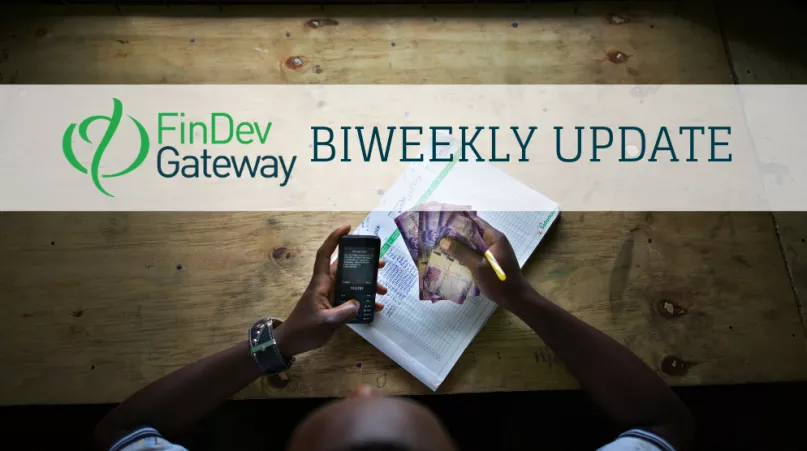
FinDev Gateway has created this COVID-19 Update with the latest and most relevant knowledge resources for financial inclusion. Sign up to receive this update to your inbox.
If you have content to share in our COVID-19 update, please submit here or contact us directly.
Do you find the FinDev Update useful? Take a moment to let us know >>
Global Update
- Financial inclusion will remain high on the list of strategic priorities for funders following the global coronavirus pandemic, according to the latest CGAP Funder Survey which tracks trends in international funding for financial inclusion. While the study focuses on data from 2019 and does not reflect funders’ response to COVID-19, a supplemental questionnaire provides a brief glimpse of funders’ perspective on financial inclusion in the wake of the global pandemic.
- COVID-19 has closed 15 percent of micro, small & medium enterprises (MSMEs) in Colombia, India, Indonesia, and Nigeria, according to a new analysis by the Center for Financial Inclusion. Women-owned businesses were twice as likely to close as men’s businesses in Indonesia, and 35 percent more likely to close in Colombia. Most businesses that managed to stay open are struggling to cover operating expenses and have no clear coping strategy but rely on multiple, and often contradictory strategies. MSMEs are also saving less and borrowing less from formal sources.
Asia
- The coronavirus pandemic has exacerbated the problem of over-indebtedness in Sri Lanka, leading to borrower suicides and calls for greater regulation of the microfinance sector.
- Sex workers in India have lost their incomes during the pandemic and many have been forced into debt as loan sharks target them with abusive debt collection practices.
- The National Bank of Cambodia asked banks and MFIs in the country to postpone the payout of 2020 dividends to their shareholders and ensure they are prepared for the COVID-19 relief measures to end.
- In India, collection efficiency for retail loans from non-bank lenders and housing finance companies has risen back to pre-pandemic levels, thanks to focused collections efforts, increased use of digital platforms and the rebounding economy. However, microfinance loans remain a source of concern as their recovery rate has not yet reached pre-COVID-19 levels. MFIs have accordingly become more cautious, with the average loan size falling by 10 percent from April to December 2020.
- In Indonesia, the increasing adoption of digital financial services during the pandemic is facilitating a move to digital banking, as the country’s regulator has announced that it will release guidelines for digital banks by the middle of 2021.
Africa
Some articles and knowledge resources referenced in this section are in French.
- In the Democratic Republic of Congo,18 out of 20 financial service providers surveyed in November 2020 reported an increase in non-performing loans, according to a study by Congolese organizations FPM ASBL and Elan RDC. The report gives recommendations to minimize the lasting negative effects of the crisis, including increasing financial literacy and the use of digital solutions.
- CICO (cash-in cash-out) agents in Kenya show signs of recovery, according to round three of a survey conducted by MSC and the Swiss Capacity Building Facility. The 15 CICO agents surveyed reported an increase in footfall, number of transactions, and commissions earned since November 2020, due primarily to the extension of their operating hours.
- In Rwanda, the value of mobile money payments increased by 206 percent in 2020 compared to 2019, a growth driven mostly by measures to curb the pandemic. However, this growth comes with a rise in multiple forms of fraud, which telcos are working to curb with awareness campaigns, as reported last September.
- A new bill in Kenya aims to regulate digital lending in order to curb predatory practices and high-interest loans. Mobile lending apps are increasingly popular in Kenya and the industry’s massive growth has been largely unregulated, with some apps offering loans with annual percentage rates of up to 400 percent and practicing debt-shaming.
For more on Africa, check out the latest Portail FinDev Biweekly Update in French.
Latin America and the Caribbean
Most articles and knowledge resources referenced in this section are in Spanish.
- Google and the Inter-American Development Bank (IDB) will invest $12.5 million to help MFIs in Latin America and the Caribbean recover from COVID-19 and undergo digital transformation.
- In Mexico, the preference for cash has gone down while digital payments are on the rise. According to the Central Bank, 65 percent of the Mexican population uses bills and coins for payments, down from 76 percent before the pandemic. 72 percent believe they can get COVID-19 by handling cash. Colombia and Brazil are seeing similar trends, and even in Argentina, where there is still a strong preference for cash, the digital bank platform MODO has reached 1 million users since it was launched last November.
- Smallholder farmers in Peru, Colombia and Paraguay have seen an improvement in accessing digital loans and technical assistance programs due to public and private sector initiatives aimed at boosting food production and protecting rural livelihoods during the pandemic.
- In Peru, more than 100,000 MSMEs will benefit from a new government program targeting enterprises hit hard by the pandemic but not included in previous stimulus packages. The initiative aims to grant entrepreneurs access to capital to resume commercial activities and will offer them lower loan interest rates and longer repayment options. Several countries in the region, including Colombia, Bolivia, Ecuador, El Salvador, and Mexico have taken similar measures.
For more on LAC, check out the latest Portal FinDev Biweekly Update in Spanish.
Arab World
Some articles and knowledge resources referenced in this section are in French and Arabic.
- Permanent business closures in Tunisia almost doubled in the last quarter of 2020, a new IFC survey shows. Over 85 percent of the businesses that continued to operate experienced a drop in liquidity and more than half of them found it difficult to access financing.
- The Central Bank of Egypt has mandated commercial banks to increase financing for SMEs from 20 to 25 percent of the total credit portfolio following the pandemic, with the aim of injecting an additional $7.5 billion into the SME sector by the end of December 2022.
- The Central Bank of Egypt is also hosting a fintech innovation sprint in March to promote a closer collaboration between tech firms and startups and financial services providers, and to find fintech solutions to the challenges brought about by COVID-19.
- The government of Kuwait estimated that it would take $1.65 billion to revitalize the country’s SME sector. The estimate comes from a preliminary study the government conducted to inform the drafting of a new financial security law to promote better access to finance for SMEs from local banks through a government guarantee program.
For more on the Arab world and resources in Arabic, check out the latest FinDev Update in Arabic.
COVID-19 Resources

COVID-19 Resource Hub
A collective space for the financial inclusion community to share experiences and lessons learned from the pandemic
FinDev Coronavirus Data Tracker
Data relevant for financial inclusion - find out who is tracking what
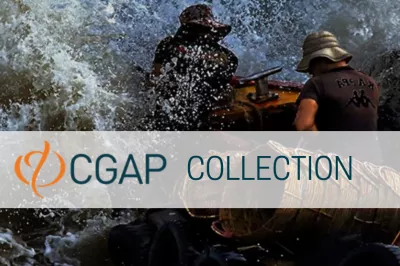
Blogs & Opinion
If you have a blog idea and would like to write for the FinDev Blog, please review our guidelines. We do not cross-post blogs that have been published elsewhere, but if you wish to share an existing blog post in our next FinDev COVID-19 Update, you can send it to us using our contact form.
Digital Finance
Three Ways to Ensure People Aren’t Left Behind in the Rush to Go Digital
22 Feb 2021 | Michael Schlein | Accion
How Digital Financial Services Can Provide a Path Toward Economic Recovery in Algeria
22 Feb 2021 | Dorothee Delort & Isabelle Poupaer | World Bank
Gender
The Importance of a Gender-Based Approach for MSE Resilience and Reinvention
17 Feb 2021 | Ximena Lizarzaburu | Fundación Capital
How MSMEs Have Coped With the Pandemic
Getting Behind the Corona Statistics: How a Small Shopkeeper Took on the Pandemic
23 Feb 2021 | Rahul Chatterjee | MicroSave Consulting (MSC)
The COVID-19 Paradox: What Made a Small Corner Shop in Uganda, Which Was Allowed to Operate During the Pandemic, Close Down?
23 Feb 2021 | Rahul Chatterjee & Anne Marie van Swinderen | MicroSave Consulting (MSC)
How Micro- and Small Enterprises (MSEs) Leveraged Informal Financing and Digital Technology During the COVID-19 Pandemic in Zambia
22 Feb 2021 | Constantine Manda, Floyd Mwansa, Sylivera Massawe & Benjamin Mazzotta | BFA Global
The Corner Shop Diaries Project: How Small Businesses in Developing Countries Coped With the Pandemic, Helped the Neighborhood to Survive the Lockdown, and Embarked on the Challenging Journey to Recovery
17 Feb 2021 | Graham Wright, Rahul Chatterjee, Raunak Kapoor & Anne Marie van Swinderen | MicroSave Consulting (MSC)
Recent Publications
Do you have a publication to add to this list? Share your work on FinDev Gateway.
On the Economic Frontlines of COVID-19: Early Insights From MSMEs Grappling With the Crisis
Center for Financial Inclusion at Accion | Feb 2021
Helping Low- and Moderate-Income Malaysians Save
United Nations Capital Development Fund (UNCDF) | Feb 2021
2019 Trends in International Funding for Financial Inclusion
CGAP | Feb 2021
Impact of the COVID-19 Pandemic on Farmers- Kenya Report (Round 3)
MicroSave Consulting (MSC) | Dec 2020
Impact of the COVID-19 Pandemic on CICO Agents- Kenya Report (Round 3)
MicroSave Consulting (MSC) | Dec 2020
Impact of the COVID-19 Pandemic on Micro, Small, and Medium Enterprises (MSMEs)- Kenya Report (Round 3)
MicroSave Consulting (MSC) | Dec 2020
View All Publications Related to COVID-19 >
Upcoming Webinars
How Can Data Open Opportunity for Women During and After COVID-19?
04 Mar 2021 | Accion
International Women’s Day Panel 2021
11 Mar 2021 | FINCA Impact Finance
View All Upcoming Events Related to COVID-19 >
News
CBE-Hosted Fintech Innovation Sprint Launched to Address COVID-19 Challenges
| Daily News Egypt | Egypt
Pandemic Gives Extra Momentum to Cashless Drive in Japan
| The Japan Times | Japan
View All News Related to COVID-19 >
Quick Links:
FinDev Guide
About this guide
Published
Topics
Contributed by a global financial inclusion community member. Share your lessons learned
Write for usComments
Comments on this page are moderated by FinDev Editors. We welcome comments that offer remarks and insights that are relevant to the post. Learn More
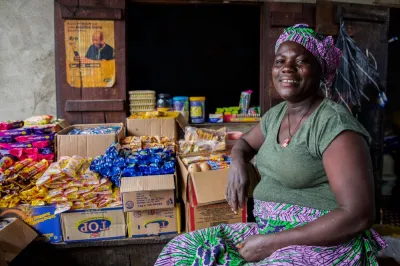
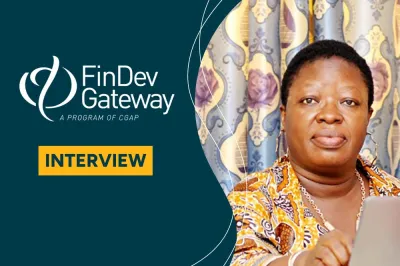
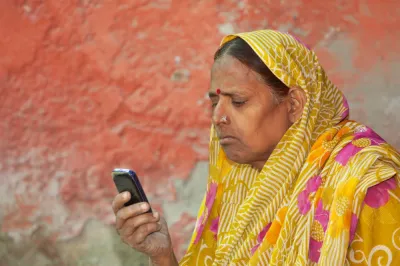
I appreciate the articles/Blogs in general, & want to participate/contribute please
Shifer from Ethiopia
Leave a comment